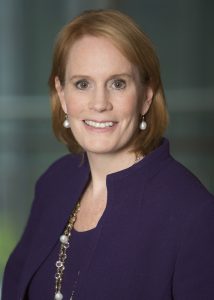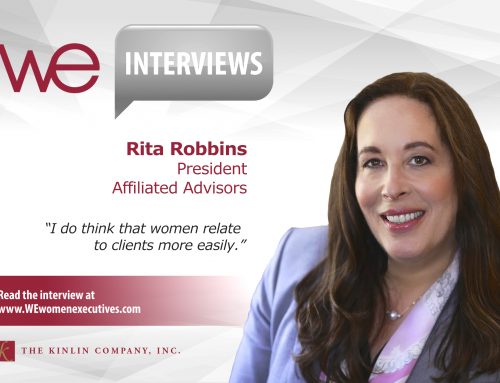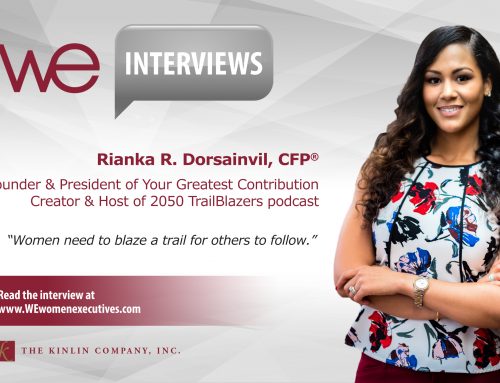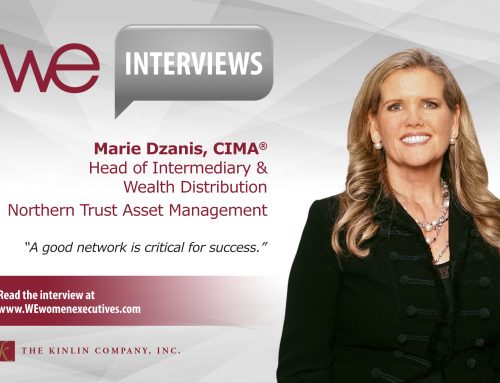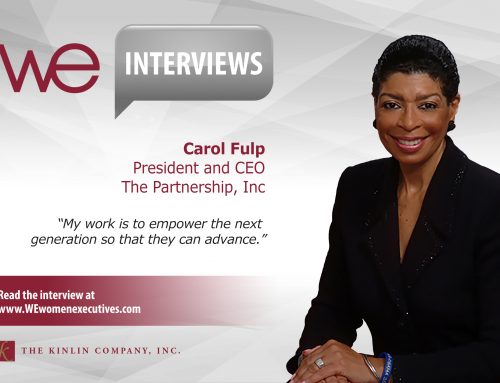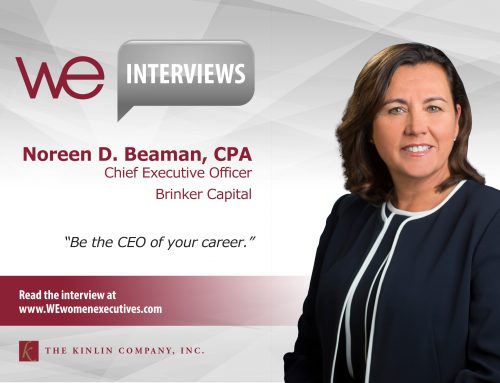Anne Ackerley
Head of BlackRock’s U.S.
and Canada Defined Distribution Group
As BlackRock’s head of the Defined Contribution Business in the U.S. and Canada, Anne Ackerley has an impressive charge, overseeing a $650 billion business with approximately 100 direct reports. Serving employers in the U.S. and Canada, from the largest to the smallest DC plans, the Defined Contribution Business operates across the spectrum. Ackerley’s group works with consultants as well as financial advisors, all with the intent of helping them get their employees prepared for retirement. The business provides a range of services, from investment advice and information on how to structure a 401(k) plan, to guidance for getting employees to save more.
I recently had the pleasure of sitting down with Ackerley to discuss her entry into the financial services sector, her continued success over the course of three decades, and her advice to others seeking to chart a similar course.
A love for action
We began with a little background. What compelled you to pursue a career in financial services, I asked, and what path led you to your current position?
“I started in financial services right after graduating from college; I went straight into investment banking, which was popular in the mid-80s. Recruiters came to Harvard’s campus and interviewed. I was an economics major and I thought it would be interesting, so I pursued the opportunity.
“As it turned out, I loved the pace of investment banking. I jumped in and learned as much as I could – my focus was banks and asset managers. Merrill Lynch actually paid for me to go to business school and then I returned to investment banking. I spent the next 16 years in the sector in a number of different roles, first as a revenue producer and then ultimately on the COO side in the merger department.
“During this period, I got to know a very young company called BlackRock. I helped them launch some of their early closed-end funds and became acquainted with Larry Fink and Rob Kapito. Eventually, they asked, ‘Would you like to come and work for us?’ It was an inflection point in my career. I loved investment banking, but there were a lot of things about asset management that interested me, so I left Merrill Lynch and went to BlackRock. It was a tiny company when I started, just five hundred people. I’ve been there over 16 years now in a number of different roles and have been a part of making the company the largest asset manager in the world – it’s been quite a ride.”
A willingness to change
Having established the rough outline of Ackerley’s career path, I was eager to drill down on the particulars. What lessons did you learn that enabled you to make meaningful contributions and move up the corporate ladder at such a steady pace, I queried.
“I think the biggest lesson I learned is that you have to embrace change. I’ve been in financial services for 32 years now. Just think about the changes that have taken place in that time: regulatory changes, technology changes, product innovation. I started at a small company and now it’s a large company. If I weren’t able to embrace change and change myself, I don’t think I would have progressed, because the skills that you need in a small company are very different from those required in a bigger company. Being in a place that embraces change is good – it keeps you challenged and invigorated. If you don’t like change, I’m not sure financial services are the right place to be.
“My second piece of advice is to be passionate. If you’re going to work these hours, you had better like what you do. And be inspiring, because people want to work for people who are inspiring.”
A desire to engage
Ackerley’s call for inspired leadership offered a natural segue into the next issue I hoped to discuss with her: mentoring. Is there a formal mentoring program at BlackRock, I asked, and if so, are you involved in that?
“One of the programs that we’re most proud of at BlackRock is our Women’s Leadership Forum (WLF) for high potential directors and high potential managing directors. We started it five or six years ago and it is really state-of-the-art.
“There were several people heavily involved in the program’s founding including Kara Helander, our former head of diversity; Jeff Smith, our head of HR; and Larry Fink, our CEO. When BlackRock was still a small company, two of our founding partners were women. The attitude was, ‘Just do the job and you will succeed; we’re a meritocracy.’ As we got bigger, went through the mergers, and grew our employee base, it became apparent that we probably do need to focus on diversity and inclusion and put some effort into making sure that we’re not only attracting diverse talent, but also retaining them and helping them develop.
“As part of WLF, we have a formal sponsorship program. Every participant in the forum gets a sponsor, and I think it’s been eye opening for those of us who have been sponsored as well as those doing the sponsoring. We’ve learned through WLF how important sponsorship is for high potential employees, particularly women.
“In addition to formal mentoring programs at the firm, I spend a huge amount of my time mentoring young women and men in a more informal manner; my door is always open.”
In light of Ackerley’s clear belief in the value of sponsors and mentors, I sought to learn more. Over the course of your career, have you enjoyed the sponsorship of anyone in particular who has really supported you and pointed you in the right direction, I asked.
“When I was an emerging vice president at Merrill Lynch, I worked very closely with a woman named Theresa Lang, whom I considered a mentor. She got promoted and then fought for me to be put into her position as the head of Closed End Funds. She said, ‘Anne, you can do it; I believe in you,’ and she used her political capital to help me get that role. She was a tremendous role model.
“My relationship with Ken Wilson, who’s my sponsor at BlackRock, is different, but has also been key in my professional development. Ken is vice chairman and was assigned to me as a sponsor. In the beginning, I wondered, ‘Can a sponsorship work if it’s assigned? How will he know what my capabilities are? Will he be willing to use his political capital to help me?’ Our relationship is more formal. I don’t waste his time, and I think a lot about how I can help him as he’s running his businesses.
“He’s been a terrific sponsor. For example, when I heard that the defined contribution job was opening, I also heard that I wasn’t being considered for it. I called Ken and said, ‘I think I’d be good at the job; let’s talk about whether that’s something I should raise my hand for,’ and Ken said, ‘Yes, you should raise your hand. I don’t know if you’ll get the job, but I’m going to advocate for an interview process.’ Ken talked to the person who was making the decision and it was agreed that anybody who wanted the job could interview. It was an internal search, because they felt they had enough candidates in-house. I hadn’t been on the short list, but they decided they’d see all the interested candidates and then choose. I nailed the interview process and became the head of Defined Contribution. Were it not for Ken’s sponsorship and willingness to say, ‘I think Anne’s a good candidate and you should at least interview her,’ I would not be in the role I’m in. People were worried that I might go through the interview process and not get the role, which would have been public knowledge. But you have to be willing to raise your hand and take risks. You have to say you want it and express your ambition. I realized that if I didn’t get the role, I’d have to deal with that. I just wanted a fair shot at the job.
“There’s another lesson in this story, too, I think. At that point, I’d been at the company for 14 years. I felt like I was a known quantity. But I learned that people only see parts of you, or they know you from one role and base their opinions of your skillset during one point in time. The lesson for me was that you have to be out there telling your story and making sure people are seeing the totality of what you’ve done.”
A belief in giving back
All this talk of sharing one’s story made me eager to hear more of Ackerley’s. I was aware of her service on a number of boards and committees in the education and mental health arenas and knew that she had been honored by the YWCA Academy of Women Leaders and the National Council for Research on Women (NCRW) for her work in advancing gender equity. What drives your involvement in these causes, I inquired.
“I believe in giving back to the community, and I’ve also discovered that you can learn a lot about leadership by working with organizations outside the office. For example, I ran my children’s PTA and served on the board of their school. I am a much better leader today because of my outside work. Financial services can be fairly hierarchical – when you’re the boss, you say it and people generally do it. But if you’re working in a not-for-profit, particularly an academic not-for-profit, leadership is not hierarchical, it’s centered on consensus building. I found that my leadership got much, much better when I started relying less on the hierarchy at work and more on building teams and gaining consensus.
I’m also very passionate about trying to help women – for example, I helped to found the Women’s Initiative Network at our company – so I want to be involved in causes that can help advance gender equity.”
A commitment to personal growth
Ackerley has obviously learned a lot about leadership and personal development during her three decades in financial services. What advice, I asked, would you give to women who are at a standstill in their career or are striving to realize greater achievements professionally?
- Take on a challenging assignment. At work we tend to think about our careers, but it’s always a give and take with the company regarding what they need you to do and what you want to do and how and when that aligns. Taking on a challenge offers a great opportunity to distinguish yourself.
- Find a good sponsor. You constantly want to be thinking, ‘Who am I? Who am I talking to? Where am I spending my time?’ It’s important not to become complacent about that piece of your career.
- Have a sense of humor. If I got upset about every one of the things that people have said to me over the years, I probably wouldn’t have had the fortitude to get through 32 years in finance.
A sense of the big picture
As we neared the end of our conversation, I couldn’t resist posing a final question to Ackerley. What’s the toughest challenge, business or personal, that you’ve ever confronted, and what skills did you use to make it through?
“In 2006, I experienced a business challenge that was also a big career challenge. BlackRock merged with Merrill Lynch, which was very exciting, and at the time I was running the retail group at BlackRock. I assumed that since we were the acquirer, I would be the head of the combined retail group. But when they combined our retail business with Merrill Lynch’s, they asked me to be the number two person rather than the number one person. They gave the head of the group to the person from Merrill Lynch.
“It was devastating. I wasn’t prepared for it. I didn’t see it coming. And not only did they say, ‘You’re not going to get the number one role,’ but they also said, ‘You’re really good at what you do, so we want you to be the number two and help to make this thing work.’ That was very, very hard for me – it felt like a demotion. So I began working with a coach, because I thought, ‘I need to figure out what I want to do. Do I want to stay with this firm? Do I want to leave this firm? I don’t want to do something in anger. I want to think about it.’ The experience taught me that how you conduct yourself in times of adversity matters a lot, and I eventually realized that I actually gained more from serving as number two than I would have if I had become the number one person and managed the group at that time.
“It was hard, and I wouldn’t wish the experience on anybody, but I made it work. I think the company was grateful that I put professional obligations before personal desires and worked with my counterpart from Merrill Lynch to merge these two groups and have them be successful. And two years later, when a great role came up that I wanted, I got it. I often tell people when they don’t get the promotion they want or the job they want, how they respond is critically important. The way you conduct yourself in hard times says a lot about your character and is often remembered.”
Ackerley is a frequent contributor to the BlackRock retirement blog. To learn more about this offering, click here.
![]()

